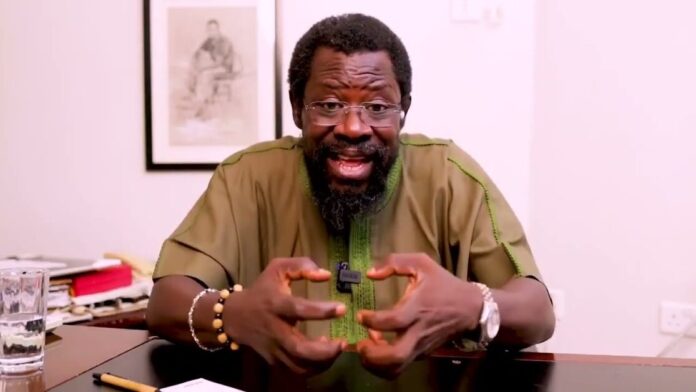The Academic Staff Union of Universities on Thursday said the ongoing strike would not be called off until the Federal Government fully implemented all the offers it made to the union after their last meeting.
The public university lecturers said they were tired of Federal Government’s antics of making unfulfilled promises, insisting that the strike would be called off after they got tangible evidence and concrete actions that the offers made to them by the Federal Government had been implemented.
The National President, ASUU, Prof. Biodun Ogunyemi, in an exclusive interview with one of our correspondents in Lagos on Thursday, said the team of the union that met with the government on Tuesday did not reach any agreement with the Federal Government.
Asked when the strike would then be called off, Ogunyemi said, “Our members said they want to see evidence of satisfactory implementation of all they have proposed before the strike can be called off.”
On Tuesday, ASUU met with the Federal Government officials including the Minister of Education, Adamu Adamu, as well as his Labour and Employment counterpart, Chris Ngige.
After their discussions, Ngige explained what the Federal Government was offering to the union.
He said the Office of the Accountant-General of the Federation and the Ministry of Finance had confirmed with evidence that N15.4bn had been released to public universities.
But ASUU president recalled that last year, the government promised to release funds for the revitalisation of public universities, which was one of the demands of the union, but failed to do so.
Ogunyemi stated, “As for the proposal, it can be disaggregated. There are items there that require implementation. If they are setting up a committee on state universities, and they actually do, it is not something we need to agree on. It is about action.
“If they have implemented it, it is off the list. If the government says it will pay a shortfall of salaries on a certain date, and the date comes and they release the money, it is also implementation. There is no agreement on the matter.
“On the revitalisation fund, we presented to the government that five tranches of N220bn each were outstanding. The government has not said it will release one, even if it is spread over a period of one year. There is no agreement on that. What they are offering is not even up to one tranche.
“Last year, they promised to release the fund but they did not till November when the strike began. Long story short, our members are saying they do not want promises again, what they want is action, implementation or disbursement of funds. The government must act in a way to convince the union that agreement has not been set aside; to show that government has not set aside the agreement, they should release one tranche.”
He explained that in order to forestall a situation ASUU and the government would restart negotiations on arrears of earned academic allowances, both sides agreed that “it would be mainstreamed into the 2019 budget.”
According to him, such an agreement was reached last year, but he said the government failed to honour it.
Ogunyemi stated, “We are going to have a discussion on when to commence renegotiation because there are still grey areas. If the government can substantially address these issues, we will be more confident to face our members on the way forward. For now, the feeler we are getting is that our members do not actually want to accept this government proposal from us.
“They said they would pay the shortfall of salary arrears of what was removed from workers’ salaries. There are 20 universities identified. The money will be available by January 18. It is around the corner and we will see if it will come.”
Also, ASUU, in its Strike Bulletin 8 issued by its President, a copy of which was obtained by one of our correspondents in Ibadan, said the Federal Government’s proposal was far below its expectations.
In its latest bulletin, the union president said the offer from the Federal Government towards meeting the demands of ASUU as contained in the 2017 Memorandum of Action was still fluid and far from expectations.
Ogunyemi asked members to await further developments on the strike.
According to him, the proposal from government towards resolving the demands of ASUU as contained in the 2017 MoA is still fluid and far from expectations.
The bulletin read in part, “Though some progress has been made with respect to discussion with government agents (The Minister of Labour and Employment as well as the Minister of Education), at the moment, the proposal from government towards resolving the demand of ASUU as contained in 2017 MoA and Strike Bulletin 1 is still fluid and far from expectations. Hence, it is the view of the National Strike Coordinating Committee that members should await further developments which are rapidly unfolding.”
When contacted, the spokesman for the Federal Ministry of Education, Mr Ben Gong, told one of our correspondents in a telephone interview that, “What the ASUU president said, which I am privy to, is that, they have received government offers, they will communicate with their various branches across the universities and that the collective decision of those branches will inform the next step they will take. That they directed their various branches to hold their meetings today (Thursday).”
The ASUU leadership is expected to return to Ngige with the outcome of its meeting with the National Executive Committee over the offers made by government to the union.
The meeting between the minister and the ASUU leadership may hold today (Friday).
ASUU had on November 4 last year declared the strike to demand improved funding of universities and implementation of previous agreements with the government.
Other demands of the union include the implementation of the 2009 FGN/ASUU agreements, Memorandum of Understanding (MoU; 2012 and 2013) and Memorandum of Action (MoA, 2017).
It also asked for the release of the forensic audit report on earned academic allowances; payment of all outstanding earned academic allowances and mainstreaming of same into salaries beginning with the 2018 budget.
The union went on strike in 2018 to compel the Federal Government to make funds available for the revitalisation of public universities, based on the FGN-ASUU MoU of 2012, 2013 and the MoA of 2017.
Ogunyemi said the union would not participate in the 2019 elections but stated that members were free to take part.
The union had on January 4 met with the Chairman of the Independent National Electoral Commission, Prof. Mahmood Yakubu and some officers of the commission. After the meeting, it resolved that it would not participate in the 2019 polls, but said that its members could take part as individuals.
He said, “In accordance with the ASUU’s long standing position, ASUU as a union will not participate in the conduct of 2019 general elections, although members may voluntarily participate in the conduct of the elections
“However, members are prohibited from participating in the election processes using any material that bears ASUU or relates to the union.”

 BIG STORY1 day ago
BIG STORY1 day ago
 BIG STORY1 day ago
BIG STORY1 day ago
 BIG STORY4 days ago
BIG STORY4 days ago
 BIG STORY5 days ago
BIG STORY5 days ago
 BIG STORY2 days ago
BIG STORY2 days ago
 BIG STORY5 days ago
BIG STORY5 days ago
 BIG STORY4 days ago
BIG STORY4 days ago
 BIG STORY2 days ago
BIG STORY2 days ago



























